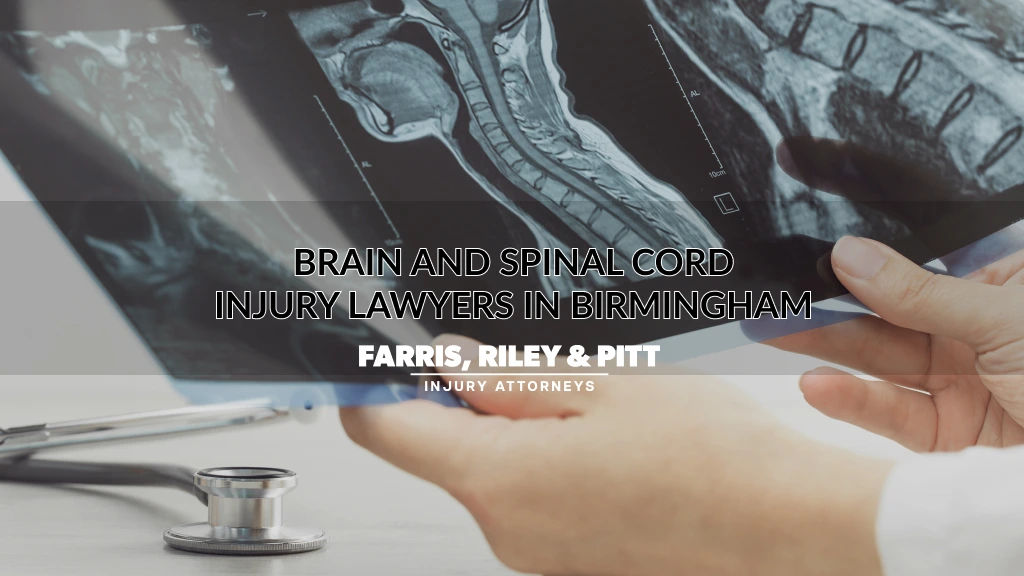
Did you or your loved one recently suffer a traumatic brain injury (TBI) or spinal cord injury (SCI) as the result of an accident caused by the negligence or deliberate conduct of another party? You should know that you could be entitled to compensation for the multitude of expenses you are likely facing for rehabilitation or daily care needs. Holding a liable party accountable can be difficult in these types of cases. You will want to contact Farris, Riley & Pitt, LLP for assistance filing these types of legal claims and recovering as much compensation as possible. Our brain and spinal cord injury lawyers in Birmingham commit to seeking justice for people in Birmingham and all other surrounding areas of Jefferson County. We have been handling catastrophic injury claims involving a variety of accidents for more than 20 years.
Any person who sustains a TBI or SCI will face an entire lifetime of recovery efforts. Farris, Riley & Pitt, LLP can provide assistance with your legal claims when you call (205) 324-1212 to take advantage of a free consultation.
Why Do I Need a Brain and Spinal Cord Injury Lawyer?
After a traumatic brain injury or spinal cord injury, an insurance company for the negligent party will very likely contact you to discourage you from bringing attorneys into your matter. More money for you, they might say.
Nothing could be further from the truth. Their sole objective when negotiating with a traumatic brain injury or spinal cord injury victim is to secure an agreement for a settlement far below what the victim deserves.
Worse yet, the agents for insurers often get victims to unknowingly make recorded statements that irreparably damage their injury claims. You can avoid these types of issues by simply hiring a skilled personal injury lawyer.
Farris, Riley & Pitt, LLP can immediately handle all communications with insurance companies on your behalf. We’ll diligently negotiate a comprehensive settlement and, if necessary, pursue legal action to address your needs.
Why Choose Farris, Riley & Pitt, LLP?
People diagnosed with TBIs or SCIs often face entire lifetimes of medical and rehabilitation expenses. Farris, Riley & Pitt, LLP has obtained multiple verdicts and settlements in excess of $1 million for these types of clients.
Our firm will collaborate with your medical provider and consult experts to secure the best possible outcome for your case. We are passionate about these types of accidents.
Kirby Farris and Ken Riley are both lifelong Alabama residents who now reside in Birmingham. They commit themselves to helping the people they consider their friends and neighbors.
You should also know that Farris, Riley & Pitt, LLP provides legal representation on a contingency fee basis, meaning you only pay us when you receive a monetary award. Call (205) 324-1212 today to have our brain and spinal cord injury lawyers in Birmingham review your case and discuss all of your legal options during a free consultation.
Cases We Handle
 Farris, Riley & Pitt, LLP has represented people who have suffered TBIs and SCIs in a broad range of accidents. Some of the most common causes have included, but are not limited to:
Farris, Riley & Pitt, LLP has represented people who have suffered TBIs and SCIs in a broad range of accidents. Some of the most common causes have included, but are not limited to:
- Car Accidents
- Truck and Tractor-Trailer Accidents
- Motorcycle Accidents
- Railroad Accidents
- Slip and Fall Accidents
- Industrial Accidents
- Drunk Driving Accidents
- Defective Products
- Child Injuries
- Burn Injuries
- Bus Accidents
- Scooter Accidents
- Rideshare Accidents (Uber/Lyft Accidents)”>Rideshare Accidents
After many such accidents, it is common for the liable party’s insurance company to question the severity of injury claims. Victims are often required to submit excessive numbers of medical records.
Traumatic brain injury victims and spinal cord injury victims face some similar journeys on the road toward recovery. However, each injury involves its own unique symptoms and complicating factors.
TBIs are challenging to prove because they often lack the visible physical signs common in many other ailments. TBIs can result in a wide variety of constant symptoms that may include headaches, dizziness, nausea, vomiting, and memory loss.
Some TBI victims require full-time daily assistance, even with regular activities. In many cases, the cognitive effects of TBIs permanently hinder a victim’s job return or employment pursuit.
Medical professionals categorize spinal cord injuries based on whether they consider a victim’s injury complete or incomplete. An incomplete spinal cord injury is a partial severance of a spinal cord. The victim usually retains some function below the affected area. In contrast, a complete spinal cord injury is the full severance of a cord. It causes the loss of all feeling and the ability to control movement below the affected area.
There are five regions that divide the spinal cord.
- Cervical (C1 – C7) — The site of the most severe injuries is typically in nerves C1 –C4. This is the uppermost region of the spinal cord. Injuries may result in paralysis in the arms, hands, trunk, and legs.
- Thoracic (T1 – T12) — Injuries to nerves in the middle of the back can affect a person’s legs and feet below the waist. Hand and arm function is often unaffected.
- Lumbar (L1 – L5) — Lower back injuries also affect body functions below the waist.
- Sacral (S1 – S5) — Injuries to the lower end of the spinal cord can also impact parts of the body below the waist. However, many victims can regain the ability to walk.
- Coccyx — Otherwise known as the tailbone, coccygeal segment injuries may involve pain but do not usually affect function.
Examples of incomplete spinal cord injuries include Brown-Sequard syndrome, anterior cord syndrome, and central cord syndrome. Complete spinal cord injuries include tetraplegia or quadriplegia (paralysis of all limbs), paraplegia (paralysis of the legs and the lower half of the body), and triplegia (paralysis of one arm and both legs).
Frequently Asked Questions
Contusions and concussions share common causes as both are TBIs typically resulting from head impacts. A contusion is a bruise in the brain that is often localized. A concussion is more widespread, involving a generalized lesion. Although a person can have a contusion without a concussion or vice versa, serious TBIs often entail both injuries.
Spinal shock involves the loss of reflexes or motor and sensory function below the level of a spinal cord injury. Spinal shock usually occurs suddenly or within hours, but it doesn’t necessarily lead to a medical shock condition. During spinal shock, certain reflexes may reappear, and some victims may not even recognize their state of spinal shock.
External force to a person’s head leads to TBIs, whereas acquired brain injuries result from other types of post-birth damage. Whereas TBIs include the frequent reasons listed above, some of the common causes of acquired brain injury include strokes, near drownings, tumors, heart attacks, and other medical conditions affecting the brain.
Brain and Spinal Cord Injury Statistics
According to recent data from the Centers for Disease Control and Prevention (CDC):
- In 2020, there were 214,110 TBI-related hospitalizations in the U.S.
- In 2021, there were 69,473 TBI-related deaths nationwide. This translates to more than 586 TBI-related hospitalizations and 190 deaths per day.
- These numbers don’t account for TBI patients who received care in emergency departments, primary care, urgent care, or those who went without treatment. Therefore, the actual rates of traumatic brain injuries are likely much higher.
- Seniors 75 and older have the highest numbers of TBI hospitalizations and deaths, accounting for 32 percent of hospitalizations and 28 percent of deaths from TBIs.
- Men are about twice as likely to be hospitalized and three times as likely to die from traumatic brain injuries as women.
- In 2019, 15 percent of U.S. high school students reported experiencing at least one sports or recreation-related concussion in the past year.
Additionally, the National Spinal Cord Injury Statistical Center (NSCISC) reports:
- Each year, there are roughly 18,000 new traumatic spinal cord injury cases, equating to 54 new cases per one million Americans.
- The current estimated count of individuals with traumatic spinal cord injuries in the U.S. lies between 255,000 and 383,000, with a probable average of about 302,000.
- Since 2015, men have constituted around 79 percent of new traumatic spinal cord injury cases.
- Vehicle crashes are the most common cause of traumatic spinal cord injuries (37.6 percent), followed by falls (31.5 percent).
- Gunshot wounds and other acts of violence account for 15.4 percent, while sports and recreational activities cause 8.3 percent of these injuries.
Contact a Birmingham Brain and Spinal Cord Injuries Lawyer Today
For more than two decades, Farris, Riley & Pitt, LLP has been fighting to protect the rights of people with catastrophic injuries such as TBIs and SCIs. Our lawyers work to provide as many solutions as possible.
If you or your loved one suffered a traumatic brain injury or spinal cord injury as a result of an accident caused by another party’s negligence in Jefferson County, you will want to be sure to contact Farris, Riley & Pitt, LLP. Call (205) 324-1212 or contact us online today to have our attorneys provide a complete evaluation of your case during a free consultation.
Related Reading:















